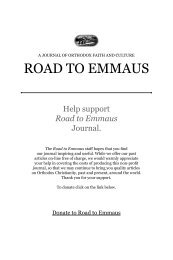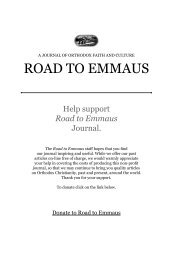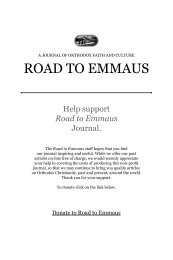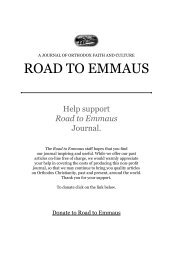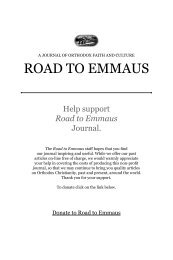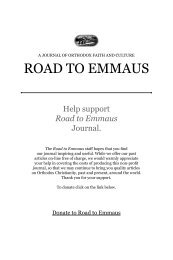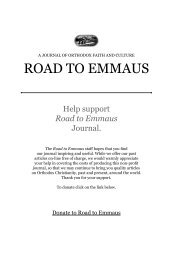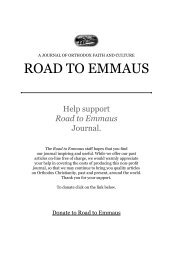<strong>Road</strong> <strong>to</strong> <strong>Emmaus</strong> Vol. 2, <strong>No</strong>. 3 (#6)Orthodoxy in Indonesia<strong>to</strong> church. Several of our people are like that. Some of the families are better.They are more open and they let their children continue in their Christianfaith without being disturbed. It differs with each person, from area <strong>to</strong> area,and even from one ethnic group <strong>to</strong> another. Some ethnic groups are morefanatical than others.Thomas: How do you encourage Orthodox Christians <strong>to</strong> conduct themselvesin public given this dangerous environment? We here in Europe often readabout persecution and martyrdom in Indonesia.Fr. Daniel: I always teach them that if there is no possible way <strong>to</strong> escape (evenif we have been trying <strong>to</strong> be good and obey the laws of society), if we becomeknown as a believer, if they stigmatize us as unbelievers as heretics or whatever,then it is obvious there is no other way – if martyrdom comes, then we have<strong>to</strong> accept it. If you cannot escape being a martyr, do it! Go for it! I teach thisin church, and I say, even <strong>to</strong> myself, that there is no other way. But still, we donot try <strong>to</strong> provoke other people. Even if we evangelize, we evangelize nicely,explaining our faith like: “this is your faith and this is our faith.” We do notdegrade other people’s beliefs.Thomas: How would you encourage Christians <strong>to</strong> look at Moslems? Thereare two tendencies in the West: either <strong>to</strong> unconcernedly accept Islamic peopleand ideas regardless of their growing numbers and cultural and religiousIndonesian priest, Fr. Alexios, during weddinginfluence; or <strong>to</strong> see them as bogey men responsible for many of the world’scurrent political problems. Of course, we know that as individuals there aremany wonderful individual Moslem people who are charitable and generous<strong>to</strong> their neighbors regardless of creed, but for many of us the overall influenceof modern Islam, particularly on Christian populations, is a question. We donot want <strong>to</strong> be naive on one hand, nor uncharitable on the other. Do youhave any thoughts on this?Fr. Daniel: It is a difficult problem indeed, even for us, because there is always adialectical relationship between us and them. In Indonesia, because they are themajority, we have <strong>to</strong> befriend them, there is no other choice. Individually, wemust treat them as anyone should be treated – with love. But theologically wehave <strong>to</strong> stand on what we believe <strong>to</strong> be true, there can be no compromise.Thomas: What do you see for the future of Orthodoxy in Indonesia?Fr. Daniel: I cannot see in<strong>to</strong> the future but I believe that Orthodoxy willcontinue <strong>to</strong> grow. It depends on more people receiving an Orthodox education– the more the better. Right now in Indonesia, Orthodoxy is still identifiedwith myself. When people think of Orthodoxy they think of me. We need<strong>to</strong> have more young people educated. Sometimes people do not understandthis – but I try my best. I try <strong>to</strong> send as many people as possible <strong>to</strong> Russia, <strong>to</strong>Greece, but I am not a bishop so I don’t have the power <strong>to</strong> arrange things soeasily. If I become a bishop, I will send as many people as possible abroad <strong>to</strong>gain experience and education in Orthodoxy, so that when I die, someone cancontinue the work. This is the main point.Thomas: Do you think that there is a likelihood of the Orthodox in Indonesiaacquiring their own bishop?Fr. Daniel: I don’t know. I can’t say anything.Thomas: How is the Indonesian Orthodox community structured?Fr. Daniel: We have two levels of structure, actually, because the OrthodoxChurch is recognized outwardly as being under the State Department ofReligion, as part of the Protestant contingent. This is because there are fiverecognized religions in Indonesia: Roman Catholic, Protestant, Islam, of course,Hindu and Buddhist. We have <strong>to</strong> fit somewhere within these five categories,so we fall under the Protestants. In terms of our relationship with the government,we have our own leader. I appoint a lay person who is responsible <strong>to</strong> me.Within the Church, we are directly responsible <strong>to</strong> the Archbishop of HongKong, who is under the Patriarch of Constantinople. On the parish level, wehave a council with a president and I am the, ah…, I don’t know what I am!
<strong>Road</strong> <strong>to</strong> <strong>Emmaus</strong> Vol. 2, <strong>No</strong>. 3 (#6)Orthodoxy in Indonesia(laughs) There is the president of the parish council and I am the priest there…the proistamenos, who directs the president. There is also a vice president, asecretary, a treasurer and such. We also have organized religious education,and a youth organization, called Hanna Arhim in Hebrew. We use a Hebrewtitle <strong>to</strong> show the Moslems that we are also Semitic,* we are not Western. So weuse a lot of Hebrew expressions in presenting ourselves <strong>to</strong> the outside, ratherthan Arabic, because Arabic is sometimes seen as imitating Islam. We havea women’s association called Saint Sophia, a priests’ association, and otherthings like that.Thomas: How does Orthodoxy in Indonesia differ in <strong>to</strong>ne or cus<strong>to</strong>m fromthe West? What is it like in your churches?Fr. Daniel: Of course it is different, first of all because we are not Westernpeople, we are Asian. So, we express our faith in an Asian way. We do not sitin chairs, we sit on the floor on a mat. We put off our shoes when we enterthe church, women wear the kafer [traditional Indonesian garb] and a veil. Wehave adapted some other cultural expressions, like in the wedding ceremonywhere we use our traditional Indonesian attire. We do not use koliva for thedead, for instance, because we do not eat wheat – it is difficult <strong>to</strong> find! Weuse rice. We make use of what we have. It’s very Indonesian, very Asian. So,the Orthodox Church in Indonesia is more eastern than in Greece or Russiaor Europe! We can’t be afraid for Orthodoxy <strong>to</strong> take on local forms.Thomas: Can we use this as a measure of the depth of penetration of Orthodoxyin<strong>to</strong> a culture?Fr. Daniel: Yes. The content is visible in the form. That also goes for peopleconverted <strong>to</strong> Orthodoxy in the Greek or Russian traditions who are themselvesnot Greek or Russian.Thomas: Does the Indonesian Orthodox community have services in Indonesianor in Greek?Fr. Daniel: Of course, in Indonesian.Thomas: What about other languages?* [Ed. <strong>No</strong>te] As a result of the strong Arabic roots of Islam, Moslems of other ethnicbackgrounds also view themselves as religiously Semitic peoples, the descendants ofAbraham, like the Jews. Most Eastern peoples view Christianity as a Western phenomenonbecause of its associations with colonialism and missionaries from the West. Fr. Daniel’sintent is <strong>to</strong> show Orthodoxy as the fulfillment of Indonesian culture - a corrective <strong>to</strong>Christian missionaries who have tried <strong>to</strong> impose Western life-styles as an integral part ofChristian belief.Indonesian congregationFr. Daniel: Sometimes if we have guests, here and there we have somethingin Greek or English. Sometimes even in Russian.Thomas: Indonesian remains the main liturgical language then, one that allthe different ethnic groups in Indonesia speak?Fr. Daniel: Yes. I have translated the services in<strong>to</strong> Indonesian for this purpose.Thomas: Generally, I don’t think that Western people know how varied thelanguages and cultures are in Indonesia.Fr. Daniel: We have 350 different languages and dialects in Indonesia, withone national language. I have translated the service books in<strong>to</strong> Indonesian,and now I’m beginning <strong>to</strong> translate them in<strong>to</strong> Javanese, which is my ethniclanguage. The services are also in the Patlak language, which is spoken onSumatra and there are plans for translation in<strong>to</strong> the Balinese language, spokenon the island of Bali. This is going slowly.
- Page 1 and 2:
A JOURNAL OF ORTHODOX FAITH AND CUL
- Page 3 and 4:
CHRIST,THE MEDICINEOF LIFE:The Syri
- Page 5 and 6:
Road to Emmaus Vol. VI, No. 1 (#20)
- Page 7 and 8:
Road to Emmaus Vol. VI, No. 1 (#20)
- Page 9 and 10:
CHRIST, THE MEDICINE OF LIFEterrors
- Page 11 and 12:
Road to Emmaus Vol. VI, No. 1 (#20)
- Page 13 and 14:
Road to Emmaus Vol. VI, No. 1 (#20)
- Page 15 and 16:
CHRIST, THE MEDICINE OF LIFEfallen
- Page 17 and 18:
Road to Emmaus Vol. VI, No. 1 (#20)
- Page 20 and 21:
Road to Emmaus Vol. VI, No. 1 (#20)
- Page 22 and 23:
Road to Emmaus Vol. VI, No. 1 (#20)
- Page 24 and 25:
CroaghPatrick:The GloriousClimb ofI
- Page 26 and 27:
Road to Emmaus Vol. XII, No. 2 (#45
- Page 28 and 29:
Road to Emmaus Vol. XII, No. 2 (#45
- Page 30 and 31:
Road to Emmaus Vol. XII, No. 2 (#45
- Page 32 and 33:
Road to Emmaus Vol. XII, No. 2 (#45
- Page 34 and 35:
Road to Emmaus Vol. XII, No. 2 (#45
- Page 36 and 37:
Road to Emmaus Vol. XII, No. 2 (#45
- Page 38 and 39:
Road to Emmaus Vol. XII, No. 2 (#45
- Page 40 and 41:
Road to Emmaus Vol. XII, No. 2 (#45
- Page 42 and 43:
Road to Emmaus Vol. XII, No. 2 (#45
- Page 44 and 45:
THEASTONISHINGMISSIONARYJOURNEYS OF
- Page 46 and 47:
the astonishing missionary journeys
- Page 48 and 49:
Road to Emmaus Vol. V, No. 4 (#19)a
- Page 51:
Road to Emmaus Vol. V, No. 4 (#19)t
- Page 55 and 56:
Road to Emmaus Vol. V, No. 4 (#19)t
- Page 57 and 58:
the astonishing missionary journeys
- Page 59 and 60:
the astonishing missionary journeys
- Page 61 and 62:
the astonishing missionary journeys
- Page 64 and 65:
Road to Emmaus Vol. V, No. 4 (#19)t
- Page 66 and 67:
Road to Emmaus Vol. V, No. 4 (#19)t
- Page 68 and 69:
Road to Emmaus Vol. V, No. 4 (#19)t
- Page 70 and 71:
Road to Emmaus Vol. V, No. 4 (#19)t
- Page 72 and 73:
Road to Emmaus Vol. XI, No. 4 (#43)
- Page 74 and 75:
Road to Emmaus Vol. XI, No. 4 (#43)
- Page 76 and 77:
Road to Emmaus Vol. XI, No. 4 (#43)
- Page 78 and 79: Road to Emmaus Vol. XI, No. 4 (#43)
- Page 80 and 81: Road to Emmaus Vol. XI, No. 4 (#43)
- Page 82 and 83: Road to Emmaus Vol. XI, No. 4 (#43)
- Page 84 and 85: Road to Emmaus Vol. XI, No. 4 (#43)
- Page 86 and 87: Road to Emmaus Vol. XI, No. 4 (#43)
- Page 88 and 89: Road to Emmaus Vol. XI, No. 4 (#43)
- Page 90 and 91: Road to Emmaus Vol. XI, No. 4 (#43)
- Page 92 and 93: NaturalConception,Natural Birth:The
- Page 94 and 95: Road to Emmaus Vol. XIII, No. 2 (#4
- Page 96 and 97: Road to Emmaus Vol. XIII, No. 2 (#4
- Page 98 and 99: Road to Emmaus Vol. XIII, No. 2 (#4
- Page 100 and 101: Road to Emmaus Vol. XIII, No. 2 (#4
- Page 102 and 103: Road to Emmaus Vol. XIII, No. 2 (#4
- Page 104 and 105: Road to Emmaus Vol. XIII, No. 2 (#4
- Page 106 and 107: Road to Emmaus Vol. XIII, No. 2 (#4
- Page 108 and 109: Road to Emmaus Vol. XIII, No. 2 (#4
- Page 110 and 111: Road to Emmaus Vol. XII, No. 1 (#44
- Page 112 and 113: Road to Emmaus Vol. XII, No. 1 (#44
- Page 114 and 115: Road to Emmaus Vol. XII, No. 1 (#44
- Page 116 and 117: Road to Emmaus Vol. XII, No. 1 (#44
- Page 118 and 119: Road to Emmaus Vol. XII, No. 1 (#44
- Page 120 and 121: Road to Emmaus Vol. XII, No. 1 (#44
- Page 122 and 123: Road to Emmaus Vol. XII, No. 1 (#44
- Page 124 and 125: Orthodoxy in IndonesiaAn Interview
- Page 126 and 127: Road to Emmaus Vol. 2, No. 3 (#6)Or
- Page 130 and 131: Road to Emmaus Vol. 2, No. 3 (#6)Or
- Page 132 and 133: 18 Road to Emmaus, Vol. 2, No. 3 (#
- Page 134 and 135: Road to Emmaus Vol. VII, No. 1 (#24
- Page 136 and 137: Road to Emmaus Vol. VII, No. 1 (#24
- Page 138 and 139: Road to Emmaus Vol. VII, No. 1 (#24
- Page 140 and 141: Road to Emmaus Vol. VII, No. 1 (#24
- Page 142 and 143: Road to Emmaus Vol. VII, No. 1 (#24
- Page 144 and 145: Road to Emmaus Vol. VII, No. 1 (#24
- Page 146 and 147: Road to Emmaus Vol. VII, No. 1 (#24
- Page 148 and 149: Road to Emmaus Vol. III, No. 3 (#10
- Page 150 and 151: Road to Emmaus Vol. III, No. 3 (#10
- Page 152 and 153: FROM JAINISM TOORTHODOXY:AN INDIANP
- Page 154 and 155: Road to Emmaus Vol. VI, No. 2 (#21)
- Page 156 and 157: FROM JAINISM TO ORTHODOXYDigambara
- Page 158 and 159: Road to Emmaus Vol. VI, No. 2 (#21)
- Page 160 and 161: FROM JAINISM TO ORTHODOXYELESA: Tha
- Page 162 and 163: Road to Emmaus Vol. VI, No. 2 (#21)
- Page 164 and 165: FROM JAINISM TO ORTHODOXYGrowing up
- Page 166 and 167: Road to Emmaus Vol. VI, No. 2 (#21)
- Page 168 and 169: FROM JAINISM TO ORTHODOXYELESA: Yes
- Page 170 and 171: Road to Emmaus Vol. VI, No. 2 (#21)
- Page 172 and 173: FROM JAINISM TO ORTHODOXYELESA: Not
- Page 174 and 175: THE GOLDENTHREAD OFFAITH:MENTAL ILL
- Page 176 and 177: Road to Emmaus Vol. V, No. 2 (#17)t
- Page 178 and 179:
the golden thread of faithare usual
- Page 180 and 181:
Road to Emmaus Vol. V, No. 2 (#17)b
- Page 182 and 183:
the golden thread of faitha great s
- Page 184 and 185:
Road to Emmaus Vol. V, No. 2 (#17)t
- Page 186 and 187:
Road to Emmaus Vol. X, No. 1 (#36)a
- Page 188 and 189:
Road to Emmaus Vol. X, No. 1 (#36)a
- Page 190 and 191:
Road to Emmaus Vol. X, No. 1 (#36)r
- Page 192 and 193:
Road to Emmaus Vol. X, No. 1 (#36)T
- Page 194 and 195:
Road to Emmaus Vol. X, No. 1 (#36)r
- Page 196 and 197:
Road to Emmaus Vol. X, No. 1 (#36)T
- Page 198 and 199:
Road to Emmaus Vol. VIII, No. 2 (#2
- Page 200 and 201:
Road to Emmaus Vol. VIII, No. 2 (#2
- Page 202 and 203:
Road to Emmaus Vol. VIII, No. 2 (#2
- Page 204 and 205:
…Krom, he who has been born in yo
- Page 206 and 207:
Abandoned Church of St. Theodore, S
- Page 208 and 209:
FAITH UNSEENMany of these crypto-Ch
- Page 210 and 211:
Old aerial view of Kromni, early 20
- Page 212 and 213:
FAITH UNSEENCrypto-Christian Baptis
- Page 214 and 215:
St. Gregory of Nyssa Church, 1930,
- Page 216 and 217:
FAITH UNSEENO Bride, keep your husb
- Page 218 and 219:
Panagia Soumela Monastery, where ma
- Page 220 and 221:
FAITH UNSEENsaid, “What I am tell
- Page 222 and 223:
Greek hunting party with visiting R
- Page 224 and 225:
FAITH UNSEENAnas of 795 AD still he
- Page 226 and 227:
Trebizond (Trabzon) city walls.
- Page 228 and 229:
FAITH UNSEENOttoman administrator,



